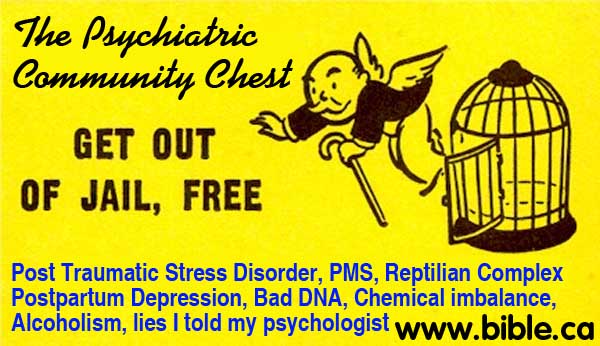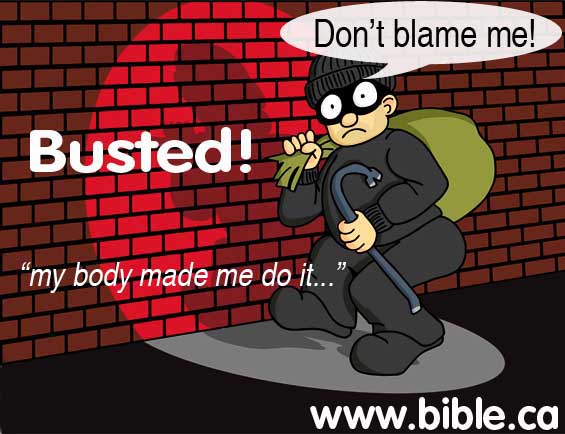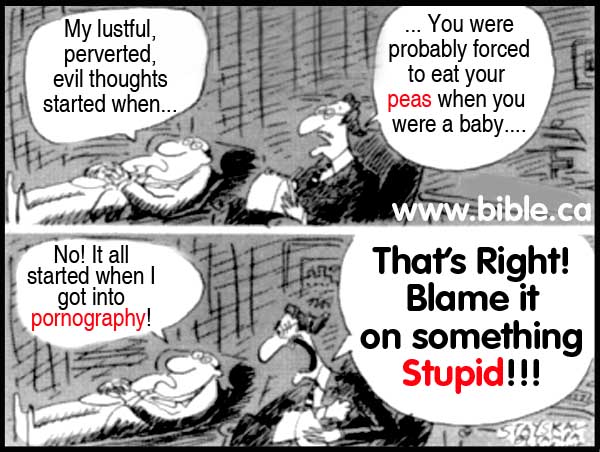Psychiatry is a vicious enemy of Christianity and the Bible.
You are a sinner and fully responsible for your actions. (2 Corinthians 5:10)
|
Psychiatry is Anti-Christian Psychiatry is Atheistic Psychiatry is Humanistic “For we must all appear before the judgment seat of Christ, so that each one may be recompensed for his deeds in the body, according to what he has done, whether good or bad.” (2 Corinthians 5:10) |
Introduction:
1. See also: "Not guilty for reasons of insanity" plea.
2. The mental health industry has widely promoted the false idea that bad and undesirable behaviours associated with insanity are not due to personal fault, but brain malfunction, while praising the same individual for good and desirable behaviours that have their origin in freewill.
a. The hypocrisy and scientific contradiction of no fault bad behaviours attributed to biology vs. meritorious good behaviours which are never attributed to brain function, but freewill, should sound the alarm of junk science.
b. "the psychiatrically correct and compassionate concept of mental illness has been that it is a "no-fault" disease. Morally, the doctrine means that if a person succeeds in life, he deserves credit for his achievement; if he fails, he must not be blamed because he is a victim of mental illness. Medically, it means bracketing mental diseases with bodily diseases and declaring them "no-fault diseases."" (Coercion as Cure, Thomas Szasz, 2007 AD, p 36)
3. The historical foundation of psychiatry detaching personal responsibility from the sinful actions of a person had their origin as far back as Johann Heinroth (1818 AD).
a. Heinroth takes the unusual position that although man becomes mad on his own free will choices, once full insanity has set in, the man becomes "unfree" and is no longer to be held responsible for his crimes. This is the earliest concept of the insanity plea in Germany. About 50 years later, the insanity plea was first used in England. "But we must not forget that in a true mental disturbance each of these disorders must occur to an extent equivalent to complete, permanent loss of freedom ... For the moment at which unfreedom makes its appearance and clearly manifests itself by unnatural, i.e., unreasonable, actions, behavior, words, glances, or gestures, that is the moment of this procreation. From this moment on, the man has lost claim to the kingdom of freedom, to the kingdom of the spirits, at least for as long as he remains in this cycle. He is an automaton: his thinking, his sensation, his activity, proceed in a mechanical manner, no matter whether it appears as if they were determined by himself. They are in fact determined by urgent impulses only, if they are controlled at all." He argues that the murderer who is insane cannot be held responsible for reason of insanity: "A murderous or a predatory attack, or a public insult and abuse can set a man entirely beside himself; and this is confusion in the highest degree. ... This condition is unfree, and a man cannot be held responsible for the consequences thereof, except if it can be proved that the condition was self-inflicted, or else that he could have prevented it from arising. ... The state of a compulsive urge occurs if somebody, without being confused, is still unable to resist the urge to commit an illegal action. The urge itself is called compulsive, since it is not voluntary but is guided by a compulsive stimulus. Heinroth states that the mad doctor alone determines if a person is "unfree" and can invoke the insanity plea. "This will be easy for the physician to determine once he has observed the type and the degree of the unfree state." Heinroth has 9 type of insanity, all of which are unfree: "Insanity, Dementia, Rage, Melancholia, Idiocy, Apathy, Insane melancholia, Confusion, Timidity" Finally, Heinroth employs all the forms of "moral treatment" that all the other mad houses were using. He gives great details on how to run an asylum and specifies a building that could be viewed in hind sight as a torture chamber: "A special building must be set aside for the physical treatment of the mentally disturbed. This building should have a special bathing section, with all kinds of baths, showers, douches, and immersion vessels. It must also have a special correction and punishment room with all the necessary equipment, including the Cox swing (or, better, rotating machine), Reil's fly-wheel, pulleys, punishment chair, Langermann's cell, etc." (Textbook of Disturbances of Mental Life and Soul, Johann Heinroth, 1818 AD)
4. "An 1846 caricature by Honore Daumier (1808-1879) is an early example of the commonsense insight into the truth about psychiatry as excuse- making and social control. The scene is a prison cell. The unkempt prisoner sits on a cot, his dandified lawyer standing before him. "What really bothers me," says the prisoner, "is that I have been accused of twelve robberies." "Twelve of them," replies the lawyer. "So much the better. I will plead monomania." This joke has since become the everyday reality of our age." (Psychiatry: The Science of Lies, Thomas Szasz, 2008 AD, p 18)
5. "Krafft-Ebing (1840-1902) was an early practitioner of the art of transforming, with the aid of Latin and a medical diploma, behaviors considered sinful into sicknesses." (Psychiatry: The Science of Lies, Thomas Szasz, 2008 AD, p 9)
6. Much later, Freud blamed sinful behaviour, outside of freewill, on the unconscious mind. Even those who were faking mental illness were merely doing what their unconscious mind was forcing them to do. So even someone who is knowingly and deliberately faking an illness to avoid service in the war was viewed by Freud as not being responsible for his actions.
a. In Freud's view the conscious mind was merely a puppet and the unconscious mind was the strings.
b. "The soldier in whom these affective motives were very powerful and clearly conscious would . . . have been obliged to desert or pretend to be ill. Only the smallest proportion of war neurotics, however, were malingerers; the emotional impulses which rebelled in them . . . were operative in them without becoming conscious to them." (Sigmund Freud, Memorandum on the Electrical Treatment of War Neurotics, 1920 AD, SE, 17:213)
c. "By creating imaginary entities-"id," "ego," "superego"-Freud alienates us from the simple truth that mental illnesses are endogenic (self-caused) phenomena that belong in the same class as do other medicalized endogenic phenomena, such as malingering and murder, and differ radically from exogenic (externally caused) phenomena, such as malaria and melanoma. Promising to demystify mental illnesses, Freud deepens the mystery by attributing the "etiology" of the "illness" to the patient's "unconscious mind." The result is a split between acts and agents, creating, as Sartre aptly puts it, lies without liars. (see: Jean-Paul Sartre, Being and Nothingness: An Essay on Phenomenological Ontology, p 51)" (Psychiatry: The Science of Lies, Thomas Szasz, 2008 AD, p 51)
7.
Psychiatrists do not have the power to thwart the judgement of God and
hand out "Get out of Judgement, Free" community chest cards in their
little game.

A. Freedom comes from confession and personal accountability:
- Listening to God. You certainly ought to "listen to your feelings" and be honest about them. "When a person assumes responsibility for his feelings," writes psychiatrist David Viscott, "he assumes responsibility for his world." But don't stop there: Take time to listen to God, and receive His words of encouragement. (W. W. Wiersbe, Be obedient 1991, Gen 15:1)
- "G. L. Harrington, in a V. A. hospital in Los Angeles, for example, worked with 210 male patients in Building 206. Building 206 was the end of the line. All hope for these men had been given up. Many could not even take care of their most elemental needs. Previously there had been an average of only two releases from Building 206 each year, but after the first year of Harrington's responsibility program, 75 men were released from the hospital, and the next year he predicted that 200 would be released-that is, almost a complete turnover. Glasser, in the Ventura State School for Girls in California, showed an 80 per cent success with hardened sociopaths in a structured total responsibility program. By success, Glasser means no return and no future violations of the law. This writer was able to view at first hand the quick and dramatic results of Mowrer's program in Illinois." (Competent to council, Jay Adams, p15)
- "Biologically based brain diseases are convenient for families and practitioners alike. It is no fault insurance against personal responsibility. We are just helplessly caught up in a swirl of brain pathology for which no one, except DNA, is responsible. Now, to begin with, anything that has an anatomically defined specific brain pathology becomes the province of neurology (syphilis is an excellent example). So, to be consistent with this "brain disease" view all the major psychiatric disorders would become the territory of our neurologic colleagues. Without having surveyed them." (L.R. Mosher, Psychiatrist, resignation letter from the American Psychiatric Association, 1998)
B. Psychiatry blames everyone except the sinner:
|
Psychiatry's practice of blaming others for our actions and rejection of personal accountability is opposite to Christianity |
|
- "I went to my psychiatrist to be psychoanalyzed To find out why I killed the cat and blacked my husband's eyes. He laid me on a downy couch to see what he could find, And here is what he dredged up from my subconscious mind: When I was one, my mommie hid my dolly in a trunk, And so it follows naturally that I am always drunk. When I was two, I saw my father kiss the maid one day, And that is why I suffer now from kleptomania. At three, I had the feeling of ambivalence toward my brothers, And so it follows naturally I poison all my lovers. But I am happy; now I've learned the lesson this has taught; That everything I do that's wrong is someone else's fault." (Anna Russell, folk song, "Jolly Old Sigmund Freud")
- "But MPD [Multiple Personality Disorder, ie. Sybil] was not the only victim-making technology of this retooled industry. Other formats emerged, all with an underlying framework that defined the patient as good but damaged by trauma and therefore a victim in need of the psychologist's help, and someone else as bad, a perpetrator, an enemy. Whether it was an alcoholic parent, an abusive spouse, a perverted teacher or doctor, a rude store clerk or an annoying or harassing colleague, the patient was always the innocent victim; the other was the malevolent cause." (Manufacturing Victims, Dr. Tana Dineen, 2001, p 260)
- "typical Mental Health organization propaganda: "Sympathetic understanding, the kind you give to a person when he is sick with a physical illness" is what the mentally ill person must have... You make allowances because you know he's sick, that he can't help his sickness, that he needs your sympathy and understanding. The person with a mental problem is also sick and most of the time he can't help it either." (Harry Milt, Director of Public Information for the National Association for Mental Health, in a pamphlet entitled "How to Deal With Mental Problems,")
- "Thus when we read in the paper that the alcoholic, the rapist or vandal . . . will be given "psychiatric care," we are assured that the problem is being effectively dealt with and we dismiss it from our minds. I contend that we have no right to this easy absolution from responsibility." (Dr. H. J. Eysenck, 1n Time Magazine, February 14, 1964, p. 43.)
- "Psychiatrists have been trying ... to dull, if not actually extract, the teeth of the law-and this is on the distinctively Freudian assumption that it is entirely natural for the criminal to act as he does and quite unreasonable for society to make him stand trial for being his antisocial self. (Richard T. LaPiere," (Psychiatry and Responsibility, 1962), p. 80.)
- "First of all, there is little you can do as ministers for people in a mental hospital. Secondly, what you can do is support the patient's right to feel injured by others. Thirdly, it is important to understand that in a mental institution people with guilt no longer are subjected to rebuke from others outside, the pressure is off, and in this way they quietly lose their guilt and get well. Fourthly, we must consider people in mental hospitals not as violators of conscience but as victims of their conscience. Finally, when we look at their erratic behavior, it seems to be sin, but it isn't; the patient is not really responsible for his actions. He can't help what he's doing; he's sick Often he blames himself for what he can't help, for what isn't his fault, and this is a cause of his problems. Consequently bad behavior as blameworthy is taboo in a mental hospital. The usual religious approach of responsibility, guilt, confession and forgiveness is no good here. The patients' conscience are already too severe. These people are morally neutral persons, and all we can do is be ventilators for them." (Mental Health Institute for pastors." The summary address of the chaplain from a state mental hospital, 1965)
- "the therapist's attempts to excuse the patient's negative and undesirable behavior on the ground that it was determined by the past and so he had no reason to feel guilty about it" (Lawrence LeShan, "Changing Trends in Psychoanalytically Oriented Psychotherapy," Mental Hygiene, July 1962, pp. 454-463).
C. Bible Verses that we must take responsibility for our own sins through confession:
- Blame shifting was man's first response to sin: Adam blames Eve, Eve blamed the serpent. None said, Its my fault!
- “The man said, “The woman whom You gave to be with me, she gave me from the tree, and I ate.” Then the Lord God said to the woman, “What is this you have done?” And the woman said, “The serpent deceived me, and I ate.”” (Genesis 3:12-13)
- Aaron claimed the golden calf just popped out of the fire all by itself!
- “Aaron said, “Do not let the anger of my lord burn; you know the people yourself, that they are prone to evil. “For they said to me, ‘Make a god for us who will go before us; for this Moses, the man who brought us up from the land of Egypt, we do not know what has become of him.’ “I said to them, ‘Whoever has any gold, let them tear it off.’ So they gave it to me, and I threw it into the fire, and out came this calf.”” (Exodus 32:22–24)
- Saul said the people made him sin. He denied personal responsibility and he was removed as king:
- “Then Saul said to Samuel, “I did obey the voice of the Lord, and went on the mission on which the Lord sent me, and have brought back Agag the king of Amalek, and have utterly destroyed the Amalekites. “But the people took some of the spoil, sheep and oxen, the choicest of the things devoted to destruction, to sacrifice to the Lord your God at Gilgal.” Samuel said, “Has the Lord as much delight in burnt offerings and sacrifices As in obeying the voice of the Lord? Behold, to obey is better than sacrifice, And to heed than the fat of rams. “For rebellion is as the sin of divination, And insubordination is as iniquity and idolatry. Because you have rejected the word of the Lord, He has also rejected you from being king.”” (1 Samuel 15:20–23)
- "For we must all appear before the judgment seat of Christ, so that each one may be recompensed for his deeds in the body, according to what he has done, whether good or bad. " 2 Corinthians 5:10
- Apostle Peter was condemned for hypocrisy:
- “But when Cephas came to Antioch, I opposed him to his face, because he stood condemned. For prior to the coming of certain men from James, he used to eat with the Gentiles; but when they came, he began to withdraw and hold himself aloof, fearing the party of the circumcision. The rest of the Jews joined him in hypocrisy, with the result that even Barnabas was carried away by their hypocrisy.” (Galatians 2:11-13)
Conclusion:
1. The psychiatry's industry pattern of denying personal responsibility is purely satanic. It is opposite to what God commands.
2. Only when we make confession of our own sins can we be free from the guilt.
3. See also: "Not guilty for reasons of insanity" plea.
By Steve Rudd: Contact the author for comments, input or corrections.
Send us your story about your experience with modern Psychiatry


